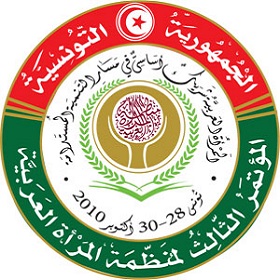
Arab Women as Main Partners in Sustainable Development
10/28/2010
to
10/30/2010
Under the auspices of Her Excellency Mrs. Leila Ben Ali
Awo's 3rd conference aimed at raising awareness on the different dimensions of sustainable development and setting an Arab vision regarding the required future level of women participation in such development.
The concept of development has raised debates and discussions at all levels both in theory and practice; was approached and studied from many political, economic and social perspectives, which varied according to the applied scientific methodology.One the most important definitions describes development as a process of transferring societies from a lower to a better level in society.
Hence, the concept of development can either be as a traditional or as a more advanced approach. While the traditional concept of development focuses on the economic side and the rule of the market, many voices, due to the inadequacy of this concept, called for the necessity to expand the concept of development to include additional objectives and dimensions to economic goals like fulfilling the needs of individuals, increasing investment in human resources capacity building and the intervention of other parties such as the State and civil society and the growing role of women.
Within the context of the changes put forward, a number of central issues and questions arise, such as:
- What is the development we actually need?
- How can we achieve a real and comprehensive development between regions, generations and gender?
|
Interaction with these changes raised awareness during the last decade of the last century, awareness of the human value as goals and means in comprehensive development. The term human development imposed itself on the economic and political discourse at the international level. The United Nations Development Programme and its annual human development reports play an important role in the dissemination and consolidation of this term . At the same time, the issue of the natural environmental capital preservation for future generations emerged. Within the context of these transformations, the features of sustainable development as a concept became clear through the identification of a close relationship between the economy and the environment and upon recognition that the economic productivity cycle does not represent in any way a "closed system" governed by quantitative criteria only, but it represents also a group of components and outputs based on the interdependence between the environmental capital – industrial capital - and human capital.
Sustainable development materialized as a concept during the ten years subsequent to the Earth Summit in 1992 and focused on human, social, political, cultural, and environmental aspects, paying greater attention to the quality of life and the preservation of environment, as well as the participation of individuals and groups in civil and political life.
Hence the importance of this subject becomes evident as being one of the main concerns of the Arab Women Organization which crosscuts all its programmes and areas of work. With the findings and conclusions reached by the survey studies and the recommendations of its first and second conferences, this concept was integrated into the universal emphasis on women human rights, expressed by the various international conferences, starting from the First Global Conference on Women (Mexico 1975) to the Fourth Conference (Beijing 1995) and the follow-up reflected in the Beijing Platform for Action and follow up evaluations (Beijing +5 and Beijing +10) which confirmed the right of all women in development as main and effective partners. The AWO Third Conference on Arab Women and Sustainable Development provides an opportunity for addressing these issues in-depth and confirming these strategic orientations.